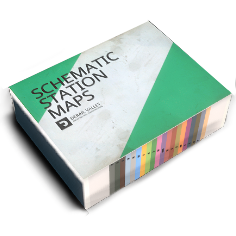Braking Overview/ja: Difference between revisions
Appearance
Updating to match new version of source page |
Updating to match new version of source page |
||
| Line 22: | Line 22: | ||
<div lang="en" dir="ltr" class="mw-content-ltr"> | <div lang="en" dir="ltr" class="mw-content-ltr"> | ||
Some of the main risks associated with brakes are: | Some of the main risks associated with brakes are: | ||
* Parked trains turning into runaways due to {{pll|Cylinder Leaks|brake cylinder leaks}} and | * Parked trains turning into runaways due to {{pll|Cylinder Leaks|brake cylinder leaks}} and misapplied {{pll|Handbrake|handbrakes}}. | ||
* Forgotten applied {{pll|Handbrake|handbrake(s)}} resulting in hindered {{pll|Vehicle Catalog Overview|pulling power}}. | * Forgotten applied {{pll|Handbrake|handbrake(s)}} resulting in hindered {{pll|Vehicle Catalog Overview|pulling power}}. | ||
* Badly set up {{pll|Air Brake System Overview|brake pipe valves}} leading to limited brake availability. | * Badly set up {{pll|Air Brake System Overview|brake pipe valves}} leading to limited train brake availability. | ||
* Traction loss resulting in {{pll|Wheelslide|wheelslide}} if brakes are applied too hard in {{pll|Weather|wet conditions}}. | * Traction loss resulting in {{pll|Wheelslide|wheelslide}} if brakes are applied too hard in {{pll|Weather|wet conditions}}. | ||
* Prolonged mechanical brake usage resulting in {{pll|Brake Shoes|brake shoe overheating}} and loss of braking power. | * Prolonged mechanical brake usage resulting in {{pll|Brake Shoes|brake shoe overheating}} and loss of braking power. | ||
| Line 36: | Line 36: | ||
<div lang="en" dir="ltr" class="mw-content-ltr"> | <div lang="en" dir="ltr" class="mw-content-ltr"> | ||
Depending on the session {{pll|Difficulty|difficulty settings}}, a flashing warning light above the {{pll|Monitoring|brake pipe gauge}} indicates | Depending on the session {{pll|Difficulty|difficulty settings}}, a flashing warning light above the {{pll|Monitoring|brake pipe gauge}} indicates certain problems with the braking system. They are: | ||
* There is a {{pll|Handbrake|handbrake}} applied somewhere on the train. | * There is a {{pll|Handbrake|handbrake}} applied somewhere on the train. | ||
* One of the {{pll|Air Brake System Overview|brake pipe valves}} is incorrectly setup somewhere on the train. | * One of the {{pll|Air Brake System Overview|brake pipe valves}} is incorrectly setup somewhere on the train. | ||
Revision as of 23:13, 3 April 2025
ブレーキは、鉄道車両に搭載されており、車両を減速したり、停止させたり、静止させるために使用される装置です。電動車両やその他の鉄道車両には通常、いくつかの異なるタイプのブレーキがあり、それぞれ目的に応じて使い分けることができます。これらはそれぞれ、運転台内または車両の外部に設置された、一般にレバーまたはクランクなどの個別の制御装置によって操作されます。
ブレーキのかけ方は、ほとんどの場合、運転士から離す方向で作られています。これは、緊急時に運転士が個々の操作手順を考えることなく、すべてのレバーを前に押し出すことで、安全対策ができるようにするためです。
ブレーキの種類は次のとおりです。
貫通ブレーキ:
列車を減速させたり、停止させたりするために使用します。
Risks
Some of the main risks associated with brakes are:
- Parked trains turning into runaways due to brake cylinder leaks and misapplied handbrakes.
- Forgotten applied handbrake(s) resulting in hindered pulling power.
- Badly set up brake pipe valves leading to limited train brake availability.
- Traction loss resulting in wheelslide if brakes are applied too hard in wet conditions.
- Prolonged mechanical brake usage resulting in brake shoe overheating and loss of braking power.
- Incorrectly setup brake cutout valves, resulting in dysfunctional train brakes.
- Excessive dynamic brake use leading to powertrain overheating.
Warnings
Depending on the session difficulty settings, a flashing warning light above the brake pipe gauge indicates certain problems with the braking system. They are:
- There is a handbrake applied somewhere on the train.
- One of the brake pipe valves is incorrectly setup somewhere on the train.
- There are more than one brake control devices cut in, or none is, on the train.
